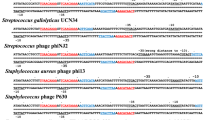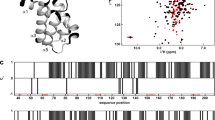Abstract
THE cI gene of bacteriophage λ codes for the λ represser. This protein is both a positive and a negative regulator of gene transcription (see ref. 1 for review). These functions are mediated by the interaction of represser with two operators in the phage DNA. Both the nucleotide sequence of the λ operators2–5 and the amino acid sequence of the λ represser have been determined6. The ability of the λ represser to bind operator DNA is greatly reduced by a proteolytic cleavage which occurs, for example, during recA-dependent prophage induction in Escherichia coli7. A single mutation (λcI ind−) prevents this cleavage and inactivation of represser7,8. I present here the nucleotide sequence of the λ cI gene and identify the base change responsible for the ind− phenotype of λ represser.
This is a preview of subscription content, access via your institution
Access options
Subscribe to this journal
Receive 51 print issues and online access
$199.00 per year
only $3.90 per issue
Buy this article
- Purchase on Springer Link
- Instant access to full article PDF
Prices may be subject to local taxes which are calculated during checkout
Similar content being viewed by others
References
Ptashne, M. et al. Science 194, 156–161 (1976).
Maniatis, T., Jeffrey, A. & Kleid, D. G. Proc. natn. Acad. Sci. U.S.A. 72, 1184–1188 (1975).
Pirrotta, V. Nature 254, 114–117 (1975).
Humayun, Z., Jeffrey, A. & Ptashne, M. J. molec. Biol. 112, 265–277 (1977).
Humayun, Z. Nucleic Acids Res. 4, 2137–2141 (1977).
Sauer, R. T. & Anderegg, R. Biochemistry 17, 1092–1100 (1978).
Roberts, J. W. & Roberts, C. W. Proc. natn. Acad. Sci. U.S.A. 72, 147–151 (1975).
Jacob, F. & Campbell, A. C.r. hebd. Séanc. Acad. Sci., Paris 248, 3219–3223 (1959).
Backman, K., Ptashne, M. & Gilbert, W. Proc. natn. Acad. Sci. U.S.A. 73, 4174–4178 (1976).
Maniatis, T., Jeffrey, A. & van de Sande, H. Biochemistry 14, 3787–3794 (1975).
Maxam, A. & Gilbert, W. Proc. natn. Acad. Sci. U.S.A. 74, 560–564 (1977).
Boyer, H. W., Chow, L. T., Dugaiczyk, A., Hedgpeth, J. & Goodman, H. W. Nature 244, 40–43 (1973).
Hughes, S. G. & Hattman, S. J. molec. Biol. 98, 645–647 (1975).
Ohmori, H., Tomizawa, J. & Maxam, A. M. Nucleic Acids Res. 5, 1479–1485 (1978).
Coulondre, C., Miller, J., Farabaugh, P. & Gilbert, W. Nature 274, 775–780 (1978).
Walz, A., Pirrotta, V. & Ineichen, K. Nature 262, 665–669 (1976).
Flashman, S. thesis, Harvard Univ. (1975).
Lieb, M. Molec. gen. Genet. 146, 285–290 (1976).
Author information
Authors and Affiliations
Rights and permissions
About this article
Cite this article
SAUER, R. DNA sequence of the bacteriophage λ cI gene. Nature 276, 301–302 (1978). https://doi.org/10.1038/276301a0
Received:
Accepted:
Issue Date:
DOI: https://doi.org/10.1038/276301a0
This article is cited by
-
Identification and characterization of a locus inhibiting extrachromosomal maintenance of theStreptomyces plasmid SLP1
Molecular and General Genetics MGG (1989)
-
Effect of the direction of DNA replication on mutagenesis by N-methyl-N′-nitro-N-nitrosoguanidine in adapted cells of Escherichia coli
Molecular and General Genetics MGG (1987)
-
Large non-homology in heteroduplex DNA is processed differently than single base pair mismatches
Molecular and General Genetics MGG (1987)
-
Recombination in the λ repressor gene: evidence that very short patch (VSP) mismatch correction restores a specific sequence
Molecular and General Genetics MGG (1985)
-
Frameshift mutagenesis of lambda prophage by 9-aminoacridine, proflavin and ICR-191
Molecular and General Genetics MGG (1984)
Comments
By submitting a comment you agree to abide by our Terms and Community Guidelines. If you find something abusive or that does not comply with our terms or guidelines please flag it as inappropriate.



